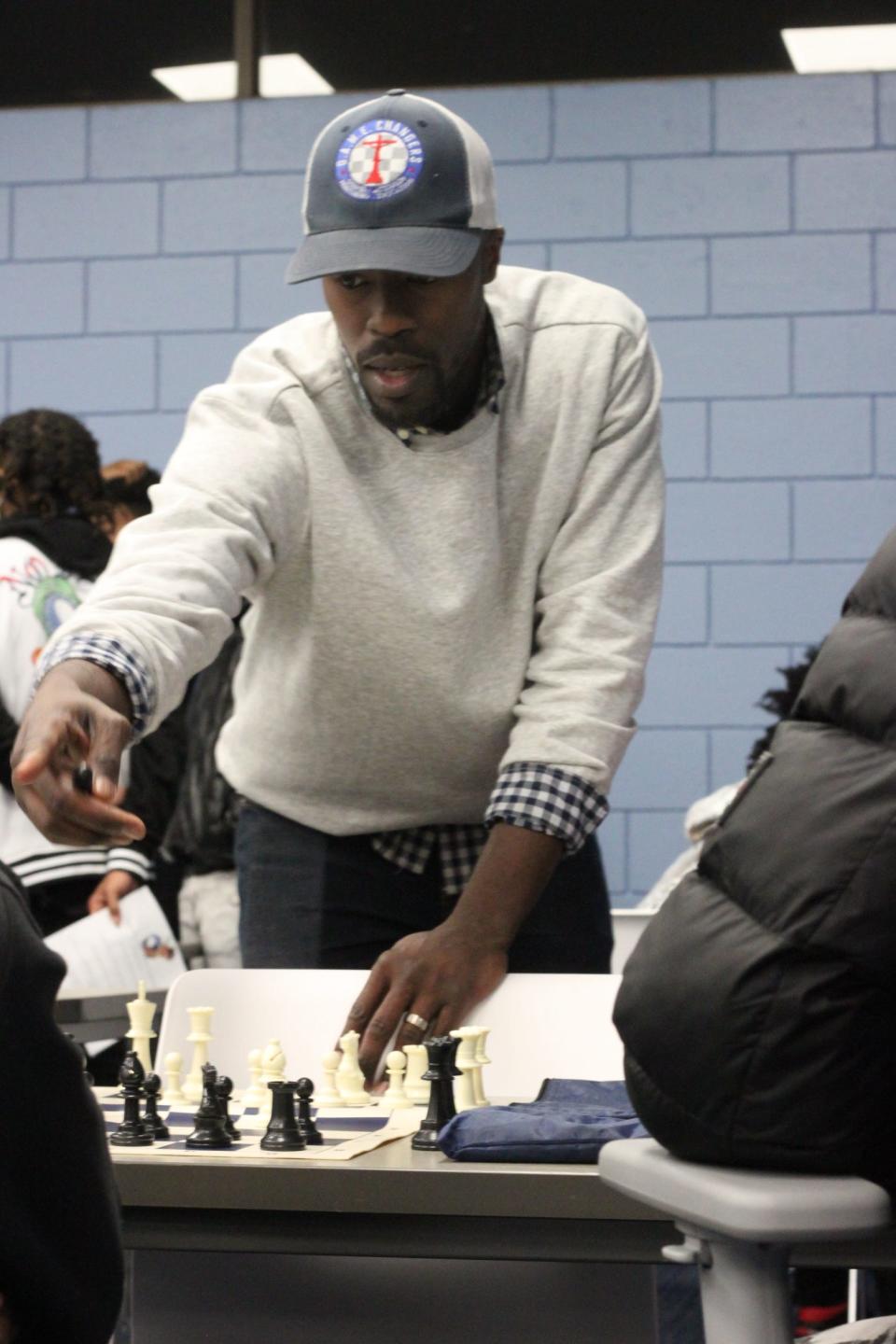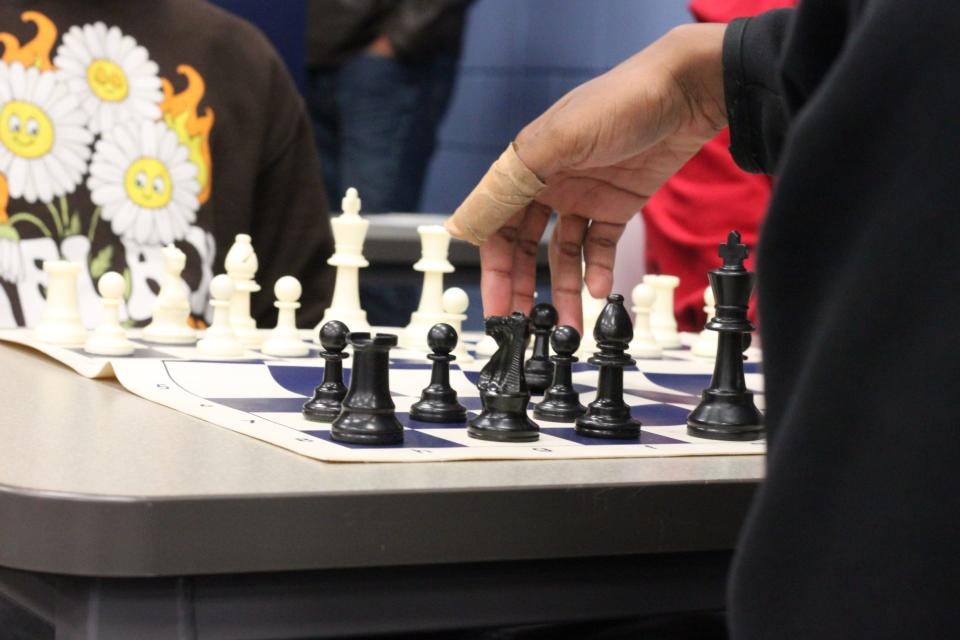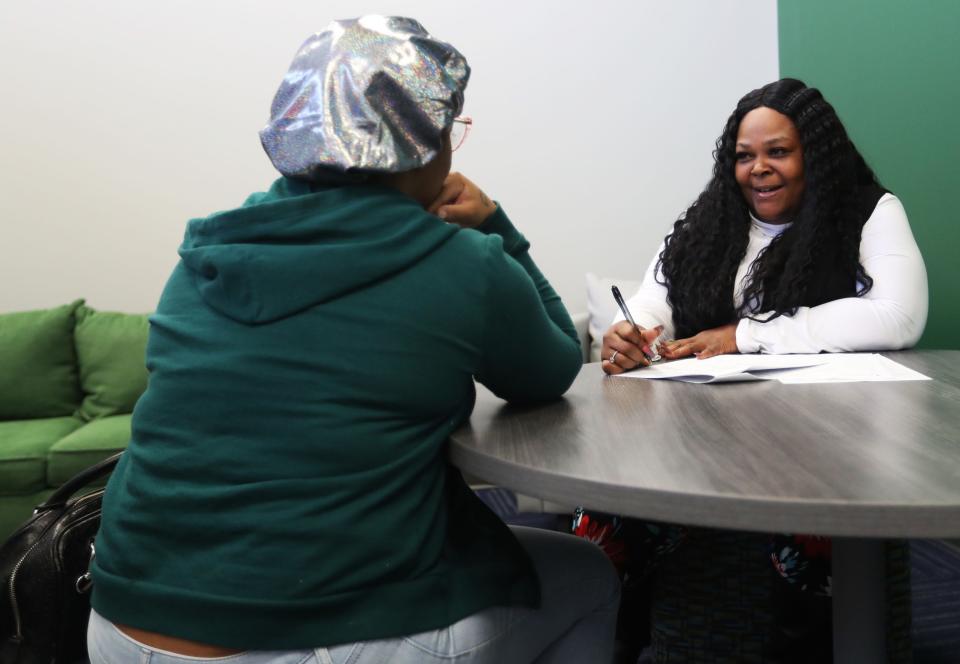At the Youth and Family Resource Center, kids find alternatives to the justice system
Before attending the Shelby County Youth and Family Resource Center, Tavores Lee Payne, 11, had back-to-back suspensions in school, his mother Emily Lee Payne said.
Lee Payne informally adopted her son when he was just 11 months old, and formally adopted him in 2021. That was the same year her husband, who had been a father and role model to Tavores, died.
With some disabilities such as ADHD, Tavores was always an energetic child, but as he got older it got worse, with him fighting, jumping off the furniture and making noise late at night.
Now, that has largely changed, Lee Payne said, thanks to the center that works to prevent and divert young people from entering or moving further into the juvenile justice system.
Now, Tavores helps relatives cook for the family. He’s into music, dominoes and basketball — especially the Memphis Grizzlies.
And, in the staff at the center, he’s found people to talk with about his struggles.
As a widowed mother, Lee Payne has received “strength” from the center, she said.
“It’s a good center,” she said. “I really wish they could put one up in every area, like Frayser, South Memphis, North Memphis. Some of these places are boarded up, put these places back into areas that can help people.”
Assessing the root cause

On a Monday night at the former Raleigh Library, Vincent Spriggs and two other volunteers sat in a circle with about 14 youths. At times the group laughed. Sometimes they took turns talking, sometimes chatting over one another. The mentoring circle allowed the youths to say whatever was on their minds.
When the group wrapped up, Spriggs, founder of G.A.M.E. Changers, and the other volunteers began teaching chess to the boys, telling them the names of each piece and how they move.
“If you play and leave your king in one spot, you’re a sitting duck,” Spriggs said.
Learning to play chess — a game that improves abstract reasoning skills — is just one of the many offerings at the center, which launched in its current form last spring.
The library was donated by the city of Memphis to Shelby County. Today, its walls are painted in blues and greens, sunlight shines through the wall-length windows and egg-shaped chairs are arranged in a circle, perfect for children who fidget to rock back and forth. Music plays and snacks or dinner are available, depending on the time of day.
The goal of the center, from the egg-shaped chairs to the wide, open spaces is to avoid giving the children a feeling that they’re being punished, said Tamika Davis, a licensed clinical social worker who is executive director.
“The idea of the assessment center is basically to stop flow into the detention centers,” Davis said. “If we can actually meet that child at the root, then we can do that. Oftentimes those roots are mental health issues that are unaddressed or even undiagnosed. Oftentimes its poverty — mom doesn’t have a place to live. Sometimes the child is struggling to be seen or heard or understood and so there’s a number of things our community faces and what an assessment center ultimately does rather than just seeing what we call bad behavior in society as bad behavior, you refer them and say can we figure out what’s really going on?”
The center was originally slated to serve children ages 13-17, but has served children even younger. Since its launch in the spring of 2022, more than 150 youths have been assessed and referred for services.
The full launch of the assessment center comes at a time when many in Shelby County are increasingly worried about juvenile crime.
At the center, which accepts referrals from schools, law enforcement and families, a child will be assessed for what’s been going wrong and what their needs are.
Originally, there was a thought about law enforcement officers dropping kids off. Instead, they’ve successfully used an appointment system.
“What we try and do is really analyze what could be contributing to the behaviors we’re seeing or the things they’re currently involved in,” said Jeremiah Berry, a mental health services coordinator.
Berry said he likes to work “backward.” For example, a child may come to the center because of a fight at school. Berry will first talk about the fight, but then move to talking about the child’s history and home, trying to find out when aggressive behavior began, “what could be the core or the trigger that’s leading to what we see today.”
Sometimes he learns that the child’s older brother passed away, triggering aggressive behavior. Then, he asks if they have ever received grief counseling.
“They say no,” Berry said. “OK, let’s start there. What I really enjoy is making it client centered. It’s not always one size fit all.”

After the assessment, the coordinator helps create a plan. That can include ADHD testing, which they do on site, psychological testing, mentoring, referral for mental health services at one of their partner agencies or support for the parents like a single mom’s group.
They also do ACT prep and grief therapy. Sometimes they have connected families to housing or mothers to jobs.
Then, they do follow-up for 6-12 months.
It takes a village to raise a child
Lee Payne first heard about the center from a former colleague,
She can walk with Tavores to the center, an important benefit since she doesn’t have a drivers license.
At the center, Tavores has joined mentor groups. Leadership there has helped connect him to disability benefits. They’ve also worked with his school to ensure that he’s receiving his Individualized Education Program, required for children who need special education, and that he’s not unjustly suspended as a child with a disability.
“Once we started going to the family resource center and I sit with them and talk to them and explain what’s going on, they’ve absolutely been wonderful reaching out, helping me out, going to the school and the meetings where I sit with the principals and teachers,” Lee Payne said.

The center has noticed changes in many of the youths who’ve attended, Davis said.
Among children who have already been involved with the juvenile justice system, 10% regress after going through the center, Davis said.
“Ultimately success is, if we’re just talking about numbers, I don’t think 10% is bad,” she said. “If we’re talking about from a more micro level how can we affect the life of a child and help them be successful, I think that looks like them finishing high school. I think that looks like them really having their mental health needs addressed.”
At the Memphis Police Department’s Austin Peay Station, Col. Lambert Ross, the station commander, has referred almost 80 youths to the center. Out of that number, only about 13 were noncompliant, he said.
The Austin Peay Station was the first to pilot referring kids to the center. Now, four stations in the area do so.
“There’s so many kids that stealing cars and all this stuff that grown people do. We’ve never had so many kids doing what kids are doing now, and I’ve been doing this for 32 years,” Ross said. “Normally it was just the shoplifting and the fights after school, but now it’s like all of this and everybody has a gun. That’s why we’re losing so many of them. … We try to tell them that it’s OK to dream and chase your dreams. You can always be whatever you want to be. When you talk to a lot of these kids all they know is what they see around them.”
At the nearby Georgian Hills Middle School, Principal Travis McGlothian also refers children to the program, as many as two or three per month.
Often the children are dealing with attendance and behavioral issues, he said, but there are root causes outside of the school setting.
“Being able to use the resource center for that support, they’re able to help families and children to address those needs and that has been able to help with our discipline issue, reducing suspension rates and increasing attendance,” McGlothian said. “It takes a village to raise a child and we all have a responsibility in Shelby County. The resource center has really stepped up to accept that responsibility. It’s not just on the teachers, it’s not just on the police, it’s not just on the politicians, but we all have a part to play.”
County has hopes for expansion
Most of the children referred are from the Raleigh neighborhood, but the center can receive referrals from all over the county.
There’s hope for expansion one day, but now the center is operating on a shoestring budget of $500,000, said Dorcas Young Griffin, director of community services for Shelby County, and some funding from the American Rescue Plan.
“We know there is a need across the city for the option for some pre-arrest diversion but also just connection to services closer to the community,” Young Griffin said.
For Lee Payne, the center is something she’d recommend to any parent struggling with their child’s behavior.
Her son will turn 12 soon and, to reward him, she’s hoping to one day take him to a Grizzlies game, she said.
“It’s a burden off of you,” she said, referring to the center. “Everything they’re doing is very beautiful. Everything.”
Katherine Burgess covers county government and religion. She can be reached at katherine.burgess@commercialappeal.com or followed on Twitter @kathsburgess.
This article originally appeared on Memphis Commercial Appeal: Shelby County program aims to divert kids from juvenile justice system

